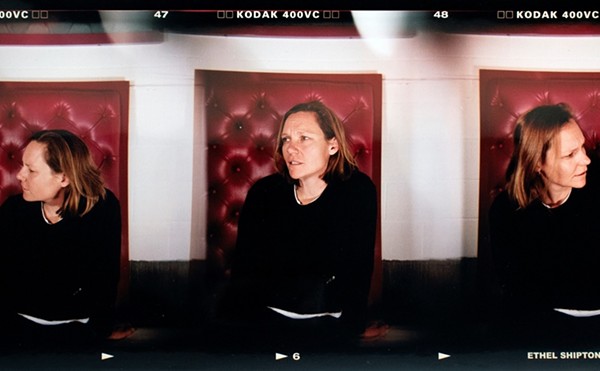Sandra Cisneros is on her cell phone, driving around on errands for this week’s Macondo Libre event at Our Lady of the Lake University. “My costume alone is driving me crazy!” she laughs. Part fiesta, part fundraiser, part literary summit, Macondo Libre is a three-night extravaganza of spoken-word performance, música, costumes, and shenanigans. The theme of the event? Pura lucha libre; and Tuesday night’s “La Palabra Eléctrica,” as well as Wednesday night’s “La Palabra Tremenda” are free to the public, and will feature live music and numerous spoken-word performances. “Come party with us!” she hollers. “Costumes are encouraged,” she adds.
For Friday night’s finale showcase, “La Palabra Peligrosa,” Cisneros will perform in costume as “La Mexican Spitfire,” while special guests Andrei “Doctor Sinístro” Codrescu, founder of “Exquisite Corpse” and frequent NPR commentator, and the noted poet Ai, a.k.a “La Mujer Pantera,” join Cisneros in a gran lucha de palabras. The tix are $25, and the proceeds will benefit the Macondo Foundation and OLLU.
Begun in 1995 as a group of writers sitting around Cisneros’s kitchen table, the Macondo Foundation has grown to include a yearly summer writing workshop, an artist-in-residency program, and has held events with UTSA, Trinity University, Esperanza Peace and Justice Center, Jump-Start Performance Theatre, and even the Bexar County Juvenile Detention Center. Officially incorporated as a non-profit in 2006, Cisneros says, “We’re still in our infancy, but it’s amazing what we’ve gotten done, little by little.”
Macondo is the name of the fictional town which Gabriel García Márquez sets into epic motion in his novel One Hundred Years of Solitude. Sleepy, hermetic, and beset by storms both meteorological and political, the town’s name is used all over Latin America as a shorthand for tragicomic absurdity; there are hundreds of Macondos.
Moving to San Antonio 20-something years or so ago, Cisneros thought, “This is Macondo. I was convinced the whole city was in some kind of time warp.” But the House on Mango Street author stuck around. “Now I see it as a magical town. Anything can happen here.”
I ask Cisneros about San Antonio’s exploding visual-arts scene, and whether she thinks we’re poised for a similar renaissance in the literary arts. She says, “I believe it. It could be like Paris in the ’20s! But there was some recent poll `of American cities` that ranked San Anto as number 64 in terms of literacy.” She sighs, “And the list only went to 69.”
Cisneros hastens to add, “But, see, `the poll` doesn’t measure our spoken-word culture. A lot of our literature isn’t written down.” She’d like the Macondo Foundation to widen the narrow scope of literary conventions. Cisneros is inspired by “San Antonio’s wonderful blurring of borders — culturas, languages, sexualities, genres, politics, generaciónes, all those boundaries,” she says.
Macondo’s writers are politically impassioned, socially conscious, and accomplished. Says Macondista Rachel Jennings, “`We` achieve social change through their writing or community involvement” and affirms that “Macondistas are ethnically, socially, linguistically, sexually, and regionally diverse. As a white Appalachian poet … I have been welcomed with open arms and hearts.” The entrance process is rigorous; all are published professionals, including some National Book Award winners. They include Joy Harjo, John Philip Santos, Dorothy Allison, Denise Chavez, Anel Flores, and Erasmo Guerra, among others. Cisneros intends to offer open admission, eventually.
Macondo Libre, she says, will go a long way toward uniting socially conscious writers with a diverse audience — an audience she aims to entertain. “It’s not gonna be some deadly dull poetry reading,” she laughs. “I’ve seen everybody from abuelitas gorditas from Beeville to mohawked kids from Austin having a good time.” This year’s audience will be wowed by Codrescu, a native of Romania, now a 20-year citizen of New Orleans — another Macondo. Cisneros reflects on NOLA and SATX as “parallel communities,” in which “there’s this incredibly rich mix of cultures, but it’s no party for the local people.” There are parallels also, she says, between post-Katrina New Orleans and San Antonio under the anxious influence of Border Wall immigration policy.
Of Ai, the Guggenheim-award-winning African-Japanese-Native American poet, Cisneros remarks, “She’s just astonishing. I remember seeing her perform when I was still a student, and she blew my mind.” Now a professor at Oklahoma State University in Stillwater, Ai “is coming by train all the way — she’s really sacrificing to get here. Sometimes we’re asleep, and we need somebody from outside to wake us up. Her work does that.”
What does Cisneros hope audiences will take from Macondo Libre?
“I meditate, hope, and pray that our words will bring the right medicine to the right person. I see what we do as healing … this is a hard-working town. We need art that nourishes the soul.” She stops and laughs. “That’s not asking too much!” •
LITERATURE
Macondo Libre La Palabra Tremenda
Featuring: Macondo Writers and Special Community Guests
7pm Wed, Jul 30
Free
Our Lady of the Lake University
Providence Hall, West Social Room
The Red Room at OLLU
La Palabra Peligrosa
Featuring: the poet Ai, Andrei Codrescu, and Sandra Cisneros
$25 donation
8pm Fri, Aug 1
Our Lady of the Lake University
Thiry Auditorium
macondoworkshop.org















